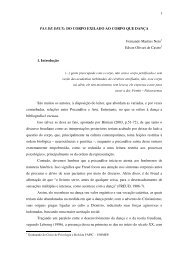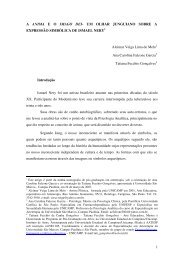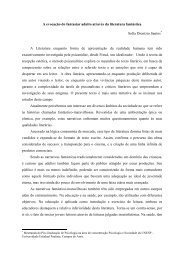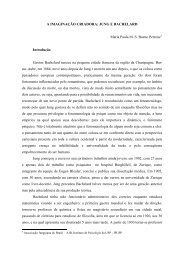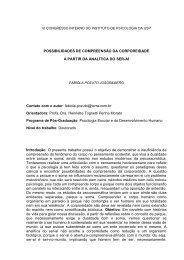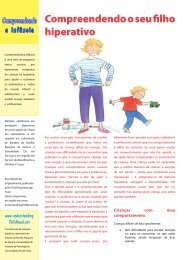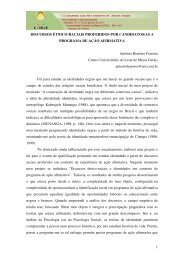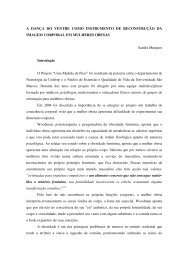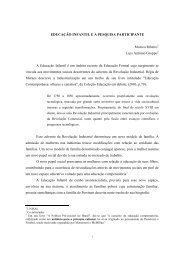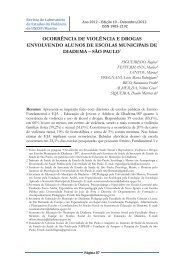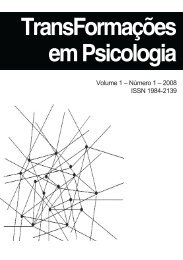Baixe em pdf - Instituto de Psicologia da USP
Baixe em pdf - Instituto de Psicologia da USP
Baixe em pdf - Instituto de Psicologia da USP
You also want an ePaper? Increase the reach of your titles
YUMPU automatically turns print PDFs into web optimized ePapers that Google loves.
Fernando César Capovilla e outros<br />
as para-instruções não apenas a partir <strong>de</strong> seus efeitos cognitivos sobre o<br />
<strong>de</strong>s<strong>em</strong>penho <strong>de</strong> edução <strong>de</strong> regras para a resolução <strong>de</strong> probl<strong>em</strong>as, como<br />
também a partir <strong>de</strong> seus efeitos subjetivos sobre estados <strong>de</strong> ânimo, o<br />
presente estudo buscou contribuir para a compreensão <strong>da</strong>s complexas<br />
relações entre cognição, ânimo, e <strong>de</strong>s<strong>em</strong>penho, enquanto mecanismos<br />
possivelmente subjacentes à produção <strong>de</strong> artefatos <strong>de</strong> pesquisa na relação<br />
sujeito-experimentador.<br />
178<br />
CAPOVILLA, F.C., CAPOVILLA, A.G.S., MACEDO, E.C., COSTA,<br />
C.E., DUDUCHI. M., Ego-Involv<strong>em</strong>ent Manipulation via<br />
Experimental Para-Instructions: Effects on Mood States and Probl<strong>em</strong><br />
Solving Performance. <strong>Psicologia</strong> <strong>USP</strong>, São Paulo, v.7, n.1/2, p.143-<br />
182, 1996.<br />
Abstract: The present study focuses on some relationships holding<br />
among causal attribution, mood states, ego involv<strong>em</strong>ent, and cognitive<br />
performance, in the context of research artifacts. Experimental parainstructions<br />
were presented immediately before a probl<strong>em</strong>-solving<br />
computerized task (Nomos), in or<strong>de</strong>r to produce high ego-involv<strong>em</strong>ent in<br />
one group, and low ego-involv<strong>em</strong>ent in another. The former attributed<br />
Nomos performance to the stable-internal attribute “intelligence”;<br />
whereas the latter attributed it to the unstable-external attribute “software<br />
quality”. Cognitive performance effects were assessed via Nomos. Mood<br />
effects were assessed via List of Present Mood States (LPMS) applied<br />
both before and after para-instructions, as well as after Nomos. Reassessment<br />
of probl<strong>em</strong>-solving abilities, as an in<strong>de</strong>pen<strong>de</strong>nt control, was<br />
obtained via Raven Progressive Matrices Test (RPMT) in the end. Parainstructions<br />
affected both LPMS ego-involv<strong>em</strong>ent and probl<strong>em</strong>-solving<br />
performance in Nomos. Mood effects were restricted to Nomos, and did<br />
not affect RPMT performance. High ego-involv<strong>em</strong>ent para-instructions<br />
<strong>de</strong>creased task-disengag<strong>em</strong>ent mood; low ego-involv<strong>em</strong>ent ones<br />
<strong>de</strong>creased task-engag<strong>em</strong>ent mood. Task-engag<strong>em</strong>ent mood was<br />
significantly greater than task-disengag<strong>em</strong>ent mood as a consequence of<br />
high ego-involv<strong>em</strong>ent para-instruction. Probl<strong>em</strong>-solving performance in<br />
Nomos un<strong>de</strong>r high ego-involv<strong>em</strong>ent was better than it was un<strong>de</strong>r low<br />
ego-involv<strong>em</strong>ent. Un<strong>de</strong>r high ego-involv<strong>em</strong>ent there was a positive<br />
correlation between Nomos and RPMT performances, but not un<strong>de</strong>r low<br />
ego-involv<strong>em</strong>ent.



